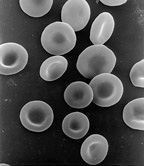
Photo from wikipedia
BACKGROUND: Unexplained recurrent spontaneous abortion (URSA) is difficult to diagnose and treat clinically due to its unknown cause OBJECTIVE: Changes in natural killer (NK) cells, T lymphocytes, and Th1(IFNγ)/Th2(IL-4) cytokines… Click to show full abstract
BACKGROUND: Unexplained recurrent spontaneous abortion (URSA) is difficult to diagnose and treat clinically due to its unknown cause OBJECTIVE: Changes in natural killer (NK) cells, T lymphocytes, and Th1(IFNγ)/Th2(IL-4) cytokines were investigated in the peripheral blood of patients with URSA to examine the pathogenesis, clinical diagnosis, and inform potential treatment strategies for this condition. METHODS: For this study, we selected patients with URSA as the case group and included normal women in the control group. Flow cytometry was performed to detect lymphocytes and cytokines in the peripheral blood of all subjects. RESULTS: The proportion of NK cells, Th1 cells, and the Th1/Th2 ratio were significantly higher in the URSA group compared to the control group; whereas the proportion of CD3+T cells was lower. Pairwise correlation analysis revealed a positive correlation between the percentage of NK cells and CD3+T cells, as well as CD3+CD4+T cells. Canonical correlation analysis indicated a significant correlation between NK cells and T cells, including their subgroups. CONCLUSION: Patients with URSA have immune balance disorders, characterised by an increased proportion of peripheral blood NK cells, Th1, and Th1/Th2 ratio along with a decreased proportion of CD3+T cells. The proportion of NK cells and CD3+T may serve as predictive factors for URSA, while NK cells are closely related to the regulation of CD3+T cells and their subsets. By regulating the level of IFN-γ, NK cells can influence the proportion of CD3+T cells and induce a Th1 (IFNγ)/Th2 (IL-4) imbalance.
Journal Title: Technology and Health Care
Year Published: 2023
Link to full text (if available)
Share on Social Media: Sign Up to like & get
recommendations!